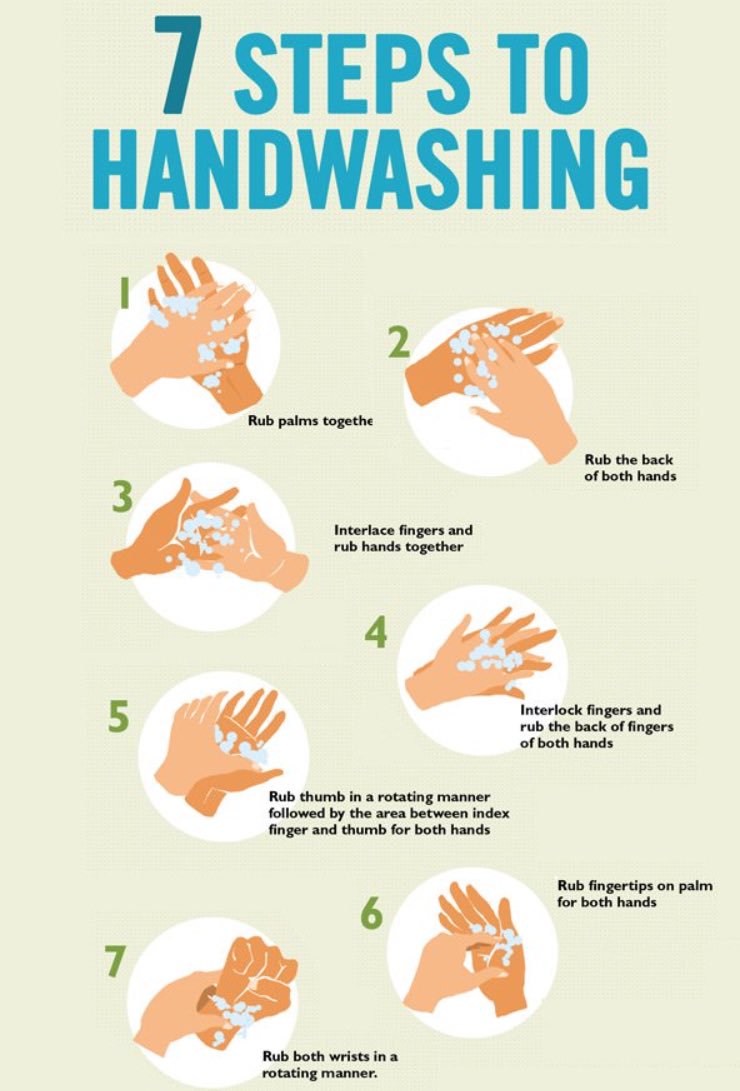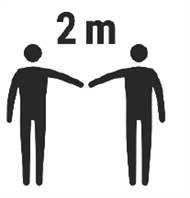Frequent Handwashing

Physical distancing
Physical distancing means limiting close contact with others.
When outside of your home, practicing social distancing by keeping two meters (six feet) away from one another is something we can all do to help stop the spread of COVID-19.

Remember to
- Stay at home when you’re sick, even if symptoms are mild
- Avoid crowded places
- This includes play dates, group walks, basketball games and gathering on the beach
- Take care of your mental well-being by checking in with loved ones and practicing self-care
- Cough and sneeze into your elbow or sleeve
- Wash your hands regularly
Facemasks should be used by people who are sick and health care workers.
Wear a mask if you are sick
Masks should be used by sick people to prevent transmission to other people. Masks are an appropriate part of infection prevention and control if you have symptoms of COVID-19 or are caring for a person with symptoms. The mask acts as a barrier and helps stop the tiny droplets from spreading when you cough or sneeze. Wearing a mask does not make it okay to go out but it can help prevent the spread of germs at home.
Using a mask is not enough and should be combined with other preventative measures such as frequent hand washing and physical distancing. Learn more about the precautions you should take if you are sick.
Wearing masks if you are healthy
Medical masks and N95 respirators should be reserved for healthcare workers.
Wearing a cloth mask is a matter of personal choice. Some people can spread the virus when they have very mild symptoms or may be unaware they are infected. In this case, wearing a mask can help in containing your own droplets and protect others but it will not protect you from COVID-19. Masks may give a person a false sense of security and are likely to increase the number of times a person will touch their own face (e.g., to adjust the mask). Any mask, no matter how efficient at filtration or how good the seal, will have minimal effect if it is not used together with other preventive measures, such as frequent hand washing and physical distancing.
It is important to treat people wearing masks with respect.
Considering the use of homemade masks
The use of a homemade mask should only be considered by members of the public who are symptomatic or caring for someone who is symptomatic as an interim measure if commercial masks are not available.
If you are making a mask, here is some information to improve the effectiveness of homemade masks:
- Some materials are better than others. Use clean and stretchy 100% cotton t-shirts or pillowcases.
- Ensure the mask fits tightly around the nose and mouth; material that allows droplets to pass through will not work.
- The mask should be comfortable, or you won’t want to wear it consistently.
- If the mask makes it a lot harder to breathe, then the seal will not be as good, and the mask will be less effective.
- Clean or change the mask often.
Disposing of used masks
Masks need to be changed frequently. To dispose of masks after use:
- Wash your hands with soap and water before taking off your mask.
- Dispose of used masks in a wastebasket lined with the plastic bag.
- After taking off your mask, wash your hands again with soap and water before touching your face or doing anything else.
- When emptying wastebaskets, take care to not touch used masks or tissues with your hands. All waste can go into regular garbage bins.
- Clean your hands with soap and water after emptying the wastebasket.
TRAVEL
British Columbians and Canadians should avoid all non-essential travel outside of Canada, including to the United States.As of March 25, 2020 it is mandatory under the Quarantine Act that anyone arriving in British Columbia from outside of Canada to self-isolate and monitor for symptoms for 14 days upon their arrival and complete/register a self-isolation plan. Learn more about self-isolation when returning from travel at our self-isolation page.
British Columbians returning from the Kearl Lake project, near Fort McMurray, Alberta, from March 24 onward, are ordered to immediately self-isolate for 14 days. Contact your primary care provider, 811 or local public health team if you develop symptoms.
Provincial Health Orders, NOtices and Guidance
For all orders from the Office of Provincial Health and Dr Bonnie Henry, PHO, including industry standards and recommendations please go to https://www2.gov.bc.ca/gov/content/health/about-bc-s-health-care-system/office-of-the-provincial-health-officer/current-health-topics/covid-19-novel-coronavirus
